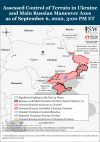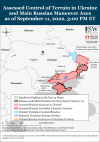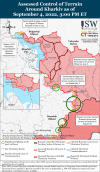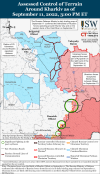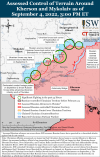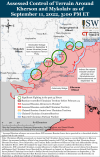MOSCOW/KYIV, Feb 17 (Reuters) - U.S. President Joe Biden said on Thursday there was now every indication Russia was planning to invade Ukraine in the next few days and was preparing a pretext to justify it, after Ukrainian forces and pro-Moscow rebels traded fire in eastern Ukraine.
The Kremlin accused Biden of stoking tension and released a strongly worded letter which accused Washington of ignoring its security demands and threatened unspecified "military-technical measures". Moscow also ejected the number two official from the U.S. embassy.
Things are heating up in the Ukraine situation.
The last Ukraine thread got closed down for devolving into political arguments. Please keep this thread restricted to discussion of current events.
Belated thanks for starting this thread. Mine is a very late contribution due to being swamped professionally for four months by the title theme itself. I will not get into the nitty-gritty with this post but rather remain at the level of meta-analysis. The reason is neither confidentiality nor a disinclination to deal in the specifics which I fully realize is the general MO at Metabunk (and which I both applaud, fully support and professionally involve in). As has become clear in the preceding discussions on this thread, the "current events" in Russia and Ukraine are inextricably intertwined with broader and deeper global socio-political dynamics and issues. Hence the following brief meta-analysis.
I have spent the bulk of my professional career of (thus far) twenty years observing and analyzing conflicts as well as performing risk analysis and quality assurance for foreign service, international development and defense operations and establishments. My work has taken me to the Mideast, Asia, Africa and L. America with a focus on post-conflict societies and fragile states. I've also lived and worked in Afghanistan for four eventful and educational years. I am also the lucky survivor of two devastating terror attacks on my compound by ideological fanatics. The latter attack was one of the most harrowing experiences of my life, saved by a heroic guard who died in his gunshot wounds.
It is with this personal background that I offer the following subjective analysis while claiming no privileged access to truth nor offering specific pieces of objective evidence in support of my argument, for doing so would bloat the analysis into a veritable dissertation which I have no time nor motivation to put together at this point. A higher level of analysis may also help us avoid getting mired into vitriolic political debates since we may be able to better see eye-to-eye on a broader level.
***
Are we facing an outbreak of another great war sparked by an 'incident' in Eastern Europe? Are we witnessing the re-enactment of the initial stages of WWI a mere century ago?
These questions are on the mind of many, and I do not claim to know the truth as wars tend to be extremely unpredictable. However, some of the root causes of both historical world wars remain as unaddressed today as they have ever been. Mankind hasn't really learnt its lessons. Hence the perennial resurgence of escalating tensions after periods of post-war lull. Until these root causes are properly addressed.
The five greatest and most persistent threats to global peace, prosperity and survival as a species are as acute as ever before. Nationalism -- herein defined as the illogical and often unconsciously espoused ideology of
exalting the interest of one's own country and people above the interest of the whole world and to be distinguished from healthy and sane patriotism -- features in these causes prominently. Each of the following causes is conducive to escalating political tensions and armed aggression between or within nations:
(1) Nationalism amongst powerful countries. Bratty power rivalry between great global and regional powers while exerting political, economic or military dominance over smaller nations. Both the power rivalry as well as the exertion of dominance over smaller nations may escalate into violent confrontations at the hands of leaders with lesser moral inhibitions to use force to advance their agendas.
(2) Nationalism of every country. Fixation of some 190 nation-states on short-term economic growth while using the world's limited natural and human resources in blind competition. This fixation manifests in a global anarchy of nation-states, climate change and inevitable tensions over limited resources which can flare up in violence.
(3) Materialist and individualist attachment to comfort and personal ambitions at the expense of seeing -- let alone addressing -- wars, conflicts and injustices elsewhere. This attachment manifests in bubble mentality and isolationism (rich countries and the bulk of their populations). It also fuels climate change.
(4) Ideologies and attitudes denigrating those that disagree or those that are different. These denigrating and prejudicial modes of thought boost a strong sense of superiority and privilege, manifesting as violence in the hands of those that view 'the other' as a grave or existential threat. Violent manifestations of prejudice usually stem from a fanatical ideological commitment incited by means of various types of propaganda or thought manipulation targeting impressionable audiences (apparent in all countries; closely connected to threat no. 5).
(5) Authoritarian leaders and cultural traditions. These authoritarian policies and traditions result in a strong attachment to power, manifesting as violent elimination of perceived threats against the powers-that-be if the threat is deemed grave or existential. They also manifest as violent revolts and insurgencies against the perceived authoritarian leader or system. They also manifest non-violently in human rights abuses; political, social or economic oppression and inequality; inequitable distribution of wealth; propaganda and media control; preservation of ignorance and a blind obedience to received prejudice-breeding ideology or tradition (more acute in poorer countries; closely connected to threat no. 4);
The first two threats are actually manifestations of one and the same root cause, namely
unbridled nationalism. Depending on the country and the regime in power, nationalism ranges from apathetic and fearful isolationism to belligerent and militant imperialism. And yet it is a universal ideology rather than restricted to some countries. In plainer terms, there are four main threats to world peace:
nationalism,
materialist self-absorption,
prejudice and
tyranny.
Even if the global majority of people subscribes to these ways of thought and action in a more moderate and non-violent manner, they inevitably give rise to violent conflicts in the hands of the few that lack such inhibitions. Ultimately, each of these foregoing threats is merely a variant of
short-term self-interest, either on a personal or a group level.
Rather than taking ownership, it is always more convenient to find scapegoats. It is easier to assign all blame to one or two of the five above-mentioned threats. Namely, those threats that do not imply my own (or my favoured countries's/world actors') role in this mess, and our own need to change and grow. Similarly, we hold on to one or two of these 'threats' with dear life as sacred principles and bulwarks of our own survival, unaware that my 'innocent' assumptions and preoccupations could also fall into a threat category.
So here we are then, stuck in the cycle of blame games and mutual fault-finding. Some will exclusively blame religious fanaticism, backward social norms and oppressive regimes as the pre-eminent threat to all civilization. Others will blame Western 'imperialism' and self-interested meddling for all ills. Ideological zealots of every hue and colour will blame the ideological zealots of their opposing camps, et cetera ad infinitum. And yet, everyone is partially right. And everyone is partially wrong.
Mankind is dangerously poised to learn the hard way the greatest lesson of its history. That the greatness of a superpower can never be demonstrated by a rooster-like display of military and economic might. That the power of political conviction or faith is never proven by hateful demonization of the dissenter and the infidel. And that 'civilization' cannot be vindicated by a culture of materialistic self-indulgence, narcissistic self-promotion and childish condescension towards "the backward", "the barbaric" and "the medieval". Our stubbornness in these fixations guarantees it's going to get uglier before it gets prettier.
And yet, a whirling maelstrom of ideas seems to underpin all historical struggle, where the greatest ideas will, hoperfully, ultimately prevail through a partially gore-soaked process of natural selection.
Ideas that, rather than splitting us into old or new tribes and pandering to our primitive passions, unite us and inspire all of us to always reach new heights in both thought and action.

